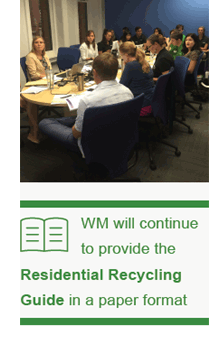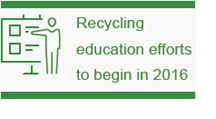

|
CURBSIDE RECYCLING
Usability Study
|

Each year, Waste Management distributes a Residential Recycling Guide to all WUTC
customers in King and Snohomish counties; the guide is tailored to each county. Although
there is high consumer awareness around recycling and curbside service is available to
most residents in the Puget Sound area, a large percentage of the waste stream continues
to be comprised of easily recycled materials.
In 2015, Waste Management conducted a usability study to evaluate its current guidelines
and/or other materials in need of updating. The goal of the research was to further improve
and coordinate educational and instructional messages. The study's results will be used to
update the guide and/or other materials.
In-person, in-depth usability interviews were conducted with 26 Waste Management
customers. The customers were asked to provide feedback on the current guide and make
suggestions for improvement; they were given the opportunity to view alternate guide
formats that may be effective.
Key takeaways included:
- Continue to provide the Residential Recycling Guide in a paper format.
- Entice customers to read the guide by highlighting something new, even if it's not
really "brand new."
- Refer customers to the website for less frequently needed information.
- Continue to use lots of colorful photographic images and place images next to the relevant text.
- Better explain that customers need to ignore the recycling symbol stamped on plastic.

|
Recycling Pilot Plan
|

The 2013 Behavior Study found that 89 percent of the households surveyed had mixed
paper in their garbage carts, the highest percentage of any recyclable material category,
including plastics. Mixed paper is defined as office paper, paperboard (cracker boxes,
mailing tubes, toilet rolls, etc.), junk mail, magazines and envelopes.
In 2015, a paper recycling pilot plan was developed for the Snohomish County WUTC
areas to help inform the development and implementation of future behavior change
campaigns under the RSA. This pilot plan centered on getting residents to recycle more
paper, focusing on the types of paper that are most prevalent in the garbage but also the most valuable in today's recycling
markets. Recommended educational materials and tools in the pilot plan were tailored specifically to the types of recyclable paper
that are found most often in the garbage.
Ultimately, in late 2015, Snohomish County elected not to implement the paper pilot, citing concerns about customer privacy and
utilizing waste sorts as an evaluation tool. In 2016, Snohomish County recycling education efforts will focus on paper and plastic
recycling education, as well as reducing recycling cart contamination.
|
|
|
|
|


